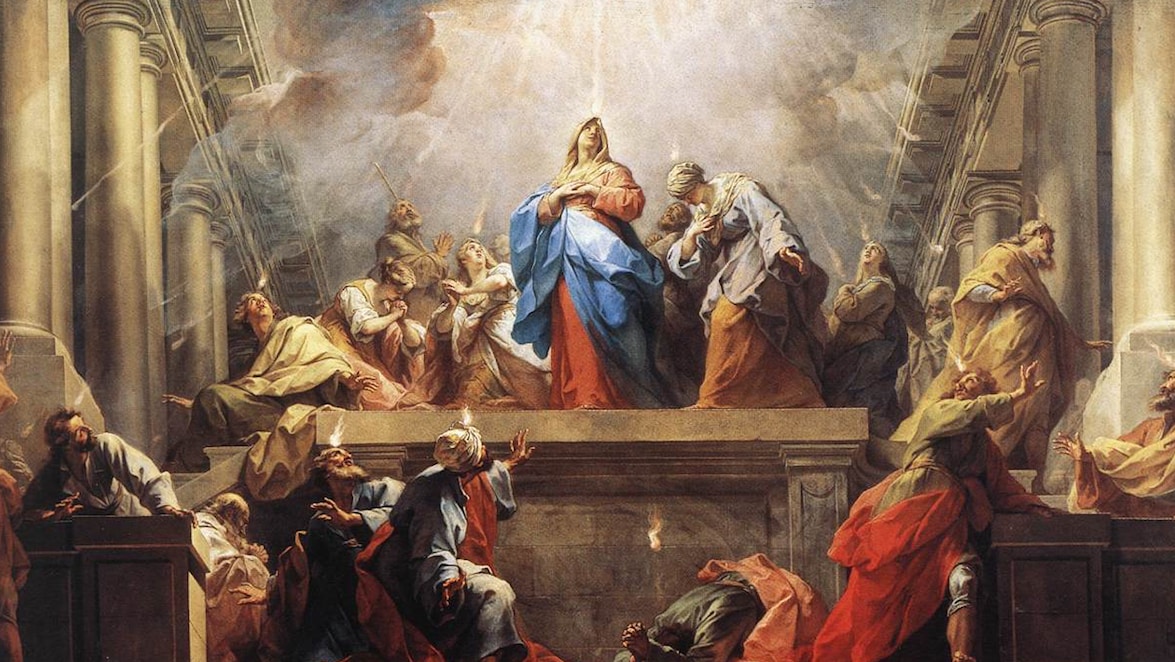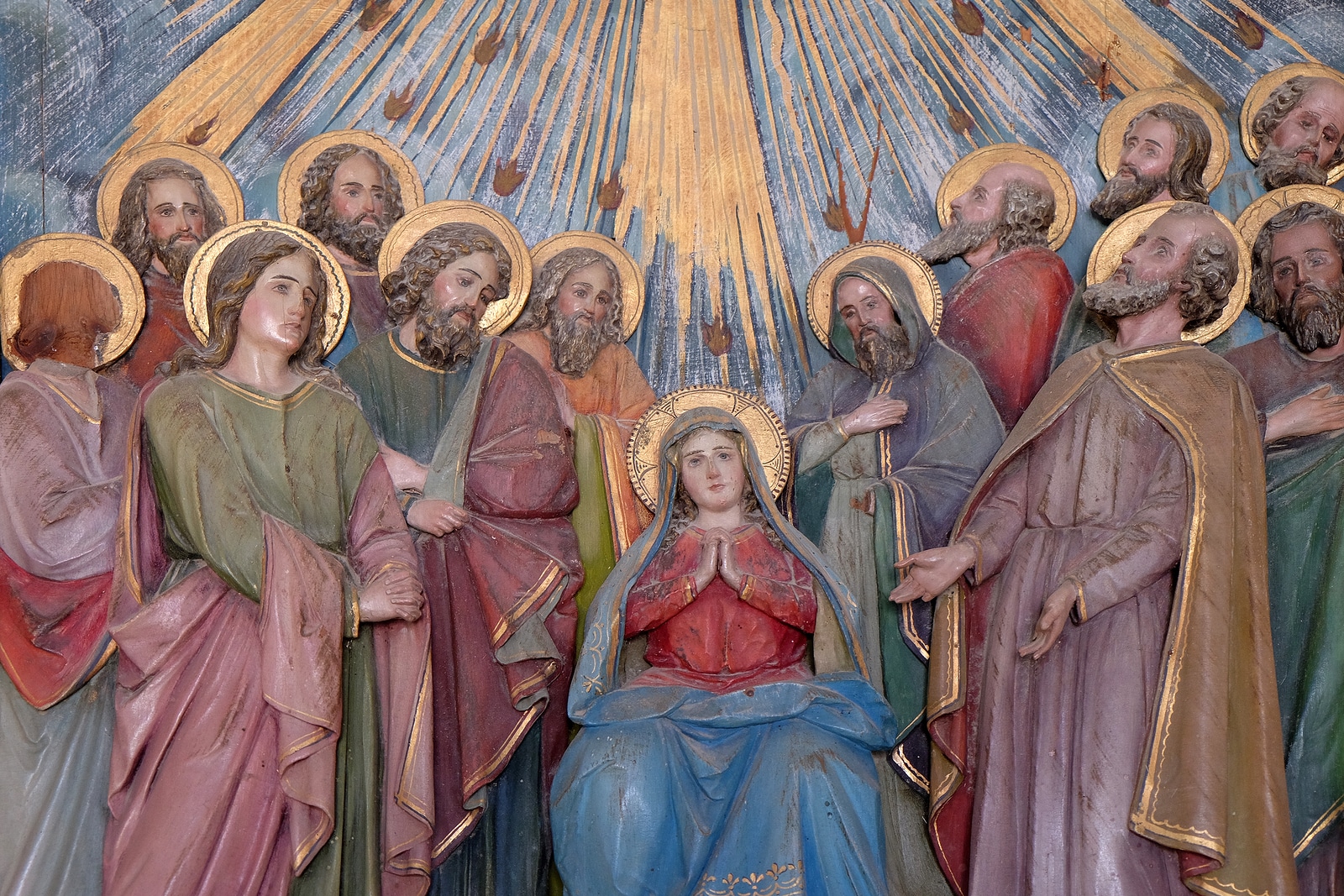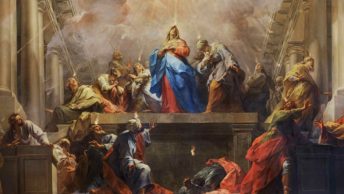We could spend the rest of our life speaking about the Holy Spirit and still have only begun to cover this most awesome subject.
The Holy Spirit is the very Life of God and we are destined to share ever more fully in that Life. Hence, given the infinite vastness of the subject, let us focus our attention on what Jesus did when he surprised the eleven who were locked up in the upper room in the evening of Easter Day.
…He breathed on them and said to them, “Receive the Holy Spirit. Whose sins you forgive are forgiven them, and whose sins you retain are retained.” (Jn. 20:23)
We focus our attention on the work of the Holy Spirit to undo the devastation of sin and also on his action to renew the face of the earth.
A week ago, on the feast of the Ascension of the Lord, we heard Jesus promising us a transformation that was to be enacted by the power of the Holy Spirit.
“But you will receive power when the Holy Spirit comes upon you…” (Acts of the Apostles 1:8) “…but stay in the city until you are clothed with power from on high” (Gospel of Luke 24:49)
Let us add other images associated with the Holy Spirit to get a fuller picture of whom we are dealing with. A strong driving wind…tongues as of fire…and in the Gospel of John (3:8), in the dialogue between Jesus and Nicodemus, the Lord compares the Holy Spirit to the total freedom of the wind.
So we are using here familiar images to get a glimpse of the incredible and completely free power of the Holy Spirit. We are dealing with the very energy of the Holy Trinity. We are confronted by a force that human beings will never be able to harness.
Yet—and here is the first injection of comfort—Jesus puts that all-consuming fire of the Holy Spirit, his unharnessable, runaway power at the discretion of selected, hand-picked men so that they can handle the destructive power of sin.
Why? Why doesn’t God tell us to go directly to him, one on one, to be freed of sin? Naturally, God can do that; he can forgive directly any sinner returning to him with a contrite heart. However this is not the official way chosen by him.
There are reasons why God has so decreed and these reasons escape almost all Protestants and some Catholics too. The most obvious reason is the one that we will never know how destructive sin truly is. Any of us, individually, cannot handle the destructive power of sin and harness the infinite power of the Spirit to forgive sin. Yes, we could go directly to God and ask him to forgive us. However, given our human nature, chances are that we would do so countless times because we would not have any incentive to mend our ways. And, we would not have any physical guarantee that the power of the Spirit had truly taken away our sin: we could be deluding ourselves big time, each time, endless times.
I mentioned the aspect of physicality. This of physicality is a crucial aspect of our faith. Our faith begins with God’s decision to take on human flesh (Jesus Christ), so as to make himself totally physical. And the Sacraments are all physical ways in which the power of the Holy Spirit is harnessed and made available to us through the hands of those selected men upon whom Jesus breathed his Spirit. In the Sacrament of Reconciliation our ears are physically touched by the words of Christ “I absolve you of all your sins. Go in peace.” We get a physical assurance that the power of the Spirit has been harnessed, given to the priest and applied to us every single time we approach God with a contrite heart and the firm resolve to change our attitude and conduct.
Listen to further evidence of this power to forgive sin given to selected men (Mt 9:2-9): And there people brought to him a paralytic lying on a stretcher. When Jesus saw their faith, he said to the paralytic, “Courage, child, your sins are forgiven.” At that, some of the scribes said to themselves, “This man is blaspheming.” Jesus knew what they were thinking, and said, “Why do you harbor evil thoughts? Which is easier, to say, ‘Your sins are forgiven,’ or to say, ‘Rise and walk’? But that you may know that the Son of Man has authority on earth to forgive sins”– he then said to the paralytic, “Rise, pick up your stretcher, and go home.” He rose and went home. When the crowds saw this they were struck with awe and glorified God who had given such authority to men.
But there is still another crucial reason why God chooses to apply the infinite power of the Spirit through selected men. And it is found in St. Paul’s Letter to the Corinthians (1 Cor 12: 3-7, 12-13): we are all baptized in one Spirit to form one Body. Again, this of a Body is a very physical image.
This means that the Holy Spirit who is the very Life of God is the very Life also of all of us as the Body of Christ; one with him, we are the Second Person of the Holy Trinity. Sin, any sin, has a tremendously adverse impact on the whole Body no matter how small, no matter how secret or minimized that sin might have been. Sin, any sin affects the whole Body in ways that are diametrically opposed to what the Spirit does.
The Spirit gives and sustains life; the Spirit sanctifies, soothes, comforts, unites, gathers, heals, strengthens, transforms, enlightens and encourages one and all in the Body of Christ. Instead, sin weakens and destroys life; sin soils and corrupts, agitates, makes restless, divides and isolates, scatters, hurts, obscures, worsens and disheartens one and all in the Body.
This is the other reason why Jesus breathes his Holy Spirit on certain people (priests/bishops) and gives them the authority to forgive or to retain sins. This is so because they represent, in a physical, visible and audible way God as well as the Body, i.e. the Church. They represent God who has been offended and disobeyed and they represent the Church, the Body that has been hurt.
We Catholics do not know how blessed we are to be served by chosen people to whom Jesus has given the incredible power to harness the Holy Spirit so that we may have Life and have it so easily and so abundantly available. We should never cease to express our gratitude to the Lord Jesus for the uninterrupted flow of grace from the Holy Spirit. By recalling and reliving the work and the action of the Holy Spirit in us and around us, we are given so many reasons to be confident in enduring our trials while gazing into a future of glory.
Our confidence or, rather, our boasting stems from the enduring and humble recognition of our frailty and proclivity to falter because we know for certain that God’s mercy is infinite; his love is boundless and the power of his Holy Spirit is made perfect in our weaknesses.








